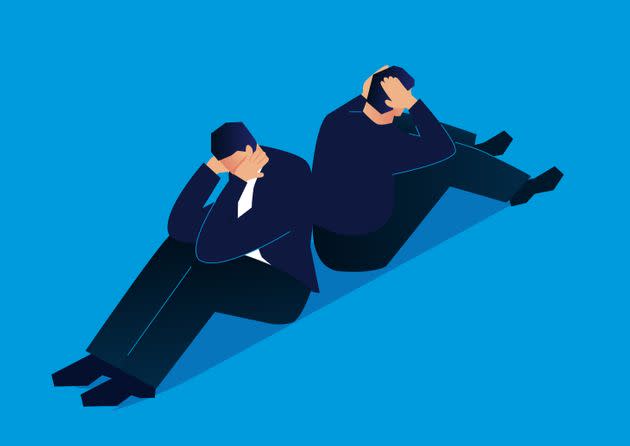Overworking Is Actually Making Your Productivity Paralysis Worse

Feeling the productivity paralysis? (Photo: sesame via Getty Images)
You’re reading Life-Work Balance, a series aiming to redirect our total devotion to work into prioritising our personal lives.
Feel like you should be doing something all the time, that you’re not doing enough unless you’re overwhelmed?
That performance anxiety causes many of us to overwork, and it could be a sign of productivity paralysis during our paid working hours.
Most of us will have experienced it at some point; an ever-growing to-do list that’s gnawing away at us. Despite its growth, the more we have to do, the more unable we are to start ticking it off.
Productivity anxiety is on the rise and only becoming more pervasive in the wake of the pandemic. According to Microsoft research, 59% of women feel they are not able to do, be, or achieve enough compared to less than two in five men (37%).
And when we feel like we’re not being productive enough during our scheduled work hours, many of us spend extra time logged on to compensate. You end up staying in a little longer, taking a shorter lunch break, or maybe even working on a weekend (this might not look like a completely rigid shift, but checking in your emails, firing them off, checking and writing updates, fulfilling tasks).
But professional ennui and paralysis is a normal part of our work lives – we all experience lulls in productivity. So why do we punish ourselves for it?
We’re expected to regulate our emotion at work – whether it’s listlessness, anger, upset – without affecting our output, but we’re human, our emotional state is likely to spill into our corporate tasks. So when feelings of overwhelm come, it’s okay to take a step back without feeling you need to later throw yourself at work. Your emotions at work don’t need to be compensated.
Hannah Oliver, 23, from Leicester, works in the engineering industry and says she can relate to overworking as compensation for productivity lulls.
She tells HuffPost UK: “I’m trying to find a good balance between making the most of my current motivated phase – before another period of productivity paralysis – and not overworking and burning out.
“I get seemingly random peaks and troughs of productivity. I haven’t yet figured out a trend as I’m still not actually officially diagnosed with ADHD. But I tend to get a few weeks of extreme motivation where I want to do everything and then a few weeks of being unable to do anything at all until deadlines get super close and my anxiety takes over and I have to power through.”
So how does Oliver deal with it?
“I think accepting its cause helps, because you can then accept you aren’t lazy, but it’s hard and often I just have to ride it out.”
Joe Ryle, director of the 4-day week campaign, says there’s a solution to not feeling overwhelmed by work: being rested.
“Working too much often leads to productivity paralysis so the answer is a shorter working week,” he tells HuffPost UK.
“A rested worker is a better worker. By reducing the working week we can give our brains a rest which then allows us to perform more effectively and creatively at work.”
But won’t that mean you’re even more swamped on the days you work, leading to overwhelm? Well, it’s about an overhaul of our work culture, says Ryle, so that the team is working more effectively.
So if a company moves to a four-day structure, it might mean a division of tasks so that everyone has a manageable plate. They then also have enough downtime so when they return to work, they can apply themselves fully.
Ryle adds: “The UK has an acute problem when it comes to working hours as we work some of the longest hours in Europe while having one of the least productive economies.
“Working all the time is bad for productivity. We need a four-day working week with no loss of pay. No one should be working longer than 32 hours a week.”
Next time you feel burnt out and under pressure to perform but are unable to, remember that it’s normal, it’ll pass and you don’t need to punish yourself or overwork yourself to ‘make up’ for it. That will only leave you in a cycle of burnout.

(Photo: HuffPost UK/ Isabella Carapella)
Life-Work Balance questions the status quo of work culture, its mental and physical impacts, and radically reimagines how we can change it to work for us.
This article originally appeared on HuffPost UK and has been updated.

 Yahoo Movies
Yahoo Movies 
